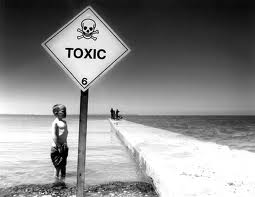 Unfortunately, we live in a toxic world. It’s nearly impossible to avoid ingesting chemicals, pesticides, additives, preservatives and other toxic elements that are prevalent in the air, water and food supply. The facts are staggering: the Environmental Protection Agency estimates that 4.7 billion pounds of toxic chemicals are released into the environment every year and an estimated 14 pounds of food coloring’s additives, preservatives, emulsifiers and flavorings are consumed per person each year. We must use Nutrition as Prevention against our toxic world.
Unfortunately, we live in a toxic world. It’s nearly impossible to avoid ingesting chemicals, pesticides, additives, preservatives and other toxic elements that are prevalent in the air, water and food supply. The facts are staggering: the Environmental Protection Agency estimates that 4.7 billion pounds of toxic chemicals are released into the environment every year and an estimated 14 pounds of food coloring’s additives, preservatives, emulsifiers and flavorings are consumed per person each year. We must use Nutrition as Prevention against our toxic world.
While that may sound grim, the human body is designed to resist damage from toxins, starting with our skin, the largest organ in the body, which protects us from pollutants in the environment. Sweating, sneezing, urinating and having bowel movements are all ways we rid ourselves of toxins every single day. Once toxins enter into circulation in the body, the liver—our body’s detoxification powerhouse—works tirelessly to eliminate these harmful compounds through waste.
So, what can you do to minimize your exposure? Thankfully, there’s a lot. Certain foods actually enhance the liver’s ability to clear toxins from the body. But the first step in clean eating—consuming whole, unprocessed foods—is to eliminate as many toxins as possible by making educated choices. Being aware of what you eat, where it comes from and how it was produced can make a big difference in lightening your toxic load, ultimately protecting your overall health.
Beware of Antibiotics and Hormones
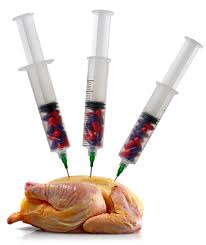 Seventy percent of the antibiotics produced in the United States are fed to healthy livestock to promote growth and reduce disease occurrence. Think about that for a minute. Repeated consumption of these meats can lead to antibiotic resistance in humans. The World Health Organization considers antibiotic resistance to be one of the top three threats to global public health and recommends banning this practice. Look for antibiotic-free meats, especially poultry (they are usually marked “certified organic.”) Talking to your butcher can help avoid confusion: Many people think “free-range” and “grass-fed” options don’t contain antibiotics, but that isn’t always the case.
Seventy percent of the antibiotics produced in the United States are fed to healthy livestock to promote growth and reduce disease occurrence. Think about that for a minute. Repeated consumption of these meats can lead to antibiotic resistance in humans. The World Health Organization considers antibiotic resistance to be one of the top three threats to global public health and recommends banning this practice. Look for antibiotic-free meats, especially poultry (they are usually marked “certified organic.”) Talking to your butcher can help avoid confusion: Many people think “free-range” and “grass-fed” options don’t contain antibiotics, but that isn’t always the case.
Limit Genetically Modified Foods
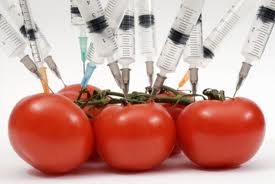 Research suggests that genetic modification of food may create allergens and contaminants. The process may also lead to insecticide-resistant bugs and herbicide-resistant weeds, which in turn leads to the use of stronger chemicals to combat the problem. Corn and other corn products, soybeans and other soybean foods, canola oil, sugar beets and potatoes are most likely to be genetically modified in the United States. Since food labels aren’t legally required to disclose the use of genetically modified ingredients, the only way to avoid them is to buy organic.
Research suggests that genetic modification of food may create allergens and contaminants. The process may also lead to insecticide-resistant bugs and herbicide-resistant weeds, which in turn leads to the use of stronger chemicals to combat the problem. Corn and other corn products, soybeans and other soybean foods, canola oil, sugar beets and potatoes are most likely to be genetically modified in the United States. Since food labels aren’t legally required to disclose the use of genetically modified ingredients, the only way to avoid them is to buy organic.
Reduce Exposure to Mercury and PCBs
Mercury, which can interfere with the brain and nervous system, is released into the air through industrial waste and accumulates in the plant life that is eaten by fish which are then eaten by us. Polychlorinated biphenyls (PCBs) are probable carcinogens that are prevalent in farmed salmon and fish from the Great Lakes. To reduce your exposure, be savvy about the fish you consume. The FDA has issued warnings against the high level of mercury found in swordfish, tilefish, king mackerel and shark, and albacore tuna contains more mercury than light canned tuna. Visit Seafoodwatch.org for more information on the safest fish varieties.
Eat Local
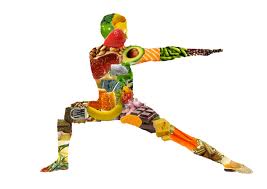 Locally grown food tastes better, contains more nutrients and may harbor fewer toxins, but it’s still important to know how the animals were raised or how the produce was grown. Ideally, choose organic options to limit your exposure to potential carcinogens, hormones, antibiotics, pesticides and other chemicals. To find farmer’s markets and Community Supported Agriculture (CSA) options in your area, visit Localharvest.org.
Locally grown food tastes better, contains more nutrients and may harbor fewer toxins, but it’s still important to know how the animals were raised or how the produce was grown. Ideally, choose organic options to limit your exposure to potential carcinogens, hormones, antibiotics, pesticides and other chemicals. To find farmer’s markets and Community Supported Agriculture (CSA) options in your area, visit Localharvest.org.
Wash Your Produce
Produce may contain pesticide or herbicide residues, bacteria and other microbes so be sure to wash everything before you eat it or cook with it (even “pre-washed” bagged vegetables). You can purchase prepared vegetable wash solutions, or simply use one teaspoon mild soap in one gallon of water. Some more prep tips: Always clean produce before cutting; use a vegetable brush to help rid the peels of any stray contaminants; and discard the outer leaves of cabbage and lettuce.
Forgo Processed Foods
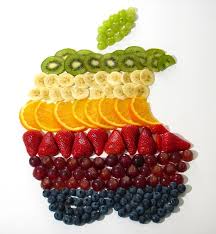 Avoid filling your cart with boxes, bags and pre-packaged items and instead shop the perimeter of the store where you’ll find produce, fresh baked goods, dairy and meat in their natural forms. If you’re considering a packaged food, put it back on the shelf if the ingredient list looks like an alphabet soup of words you can’t pronounce.
Avoid filling your cart with boxes, bags and pre-packaged items and instead shop the perimeter of the store where you’ll find produce, fresh baked goods, dairy and meat in their natural forms. If you’re considering a packaged food, put it back on the shelf if the ingredient list looks like an alphabet soup of words you can’t pronounce.
Choose Natural Sweeteners
Research suggests that high fructose corn syrup—ubiquitous in processed foods and soft drinks—may have negative effects on the liver’s ability to transform toxins for elimination. Plus, unless it’s farmed organically, corn is a genetically modified crop. There’s much controversy about other artificial sweeteners and their link to certain cancers and diseases, too. To lessen your toxic load, try natural sweeteners like maple syrup, honey and cane sugar. In moderation, they are healthier choices than synthetic ones.
Avoid Trans Fats
Trans fats are known for their artery-clogging reputation, but they’re a dietary toxin that taxes our immune systems, promoting inflammation and increasing risk of certain cancers and possibly Alzheimer’s disease. Since foods that contain up to .5 grams of trans fats are labeled as having none, the only way to avoid them is to bypass any product with partially hydrogenated oil on the ingredient list.
Drink Clean Water
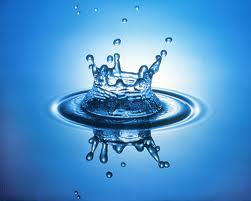 According to the National Resources Defense Council, dirty water is the world’s biggest health risk. When rain and snow-melt water flow into our water supply, they pick up toxic chemicals, dirt, trash, and disease-carrying organisms along the way. To reduce your exposure, drink filtered H2O whenever possible, and avoid reusing soft plastic water bottles–the chemicals can leach into them when reused. Consider investing in a glass or BPA-free bottle instead. For information on what chemicals and heavy metals your tap water may contain, visit the Environmental Working Group’s website.
According to the National Resources Defense Council, dirty water is the world’s biggest health risk. When rain and snow-melt water flow into our water supply, they pick up toxic chemicals, dirt, trash, and disease-carrying organisms along the way. To reduce your exposure, drink filtered H2O whenever possible, and avoid reusing soft plastic water bottles–the chemicals can leach into them when reused. Consider investing in a glass or BPA-free bottle instead. For information on what chemicals and heavy metals your tap water may contain, visit the Environmental Working Group’s website.
